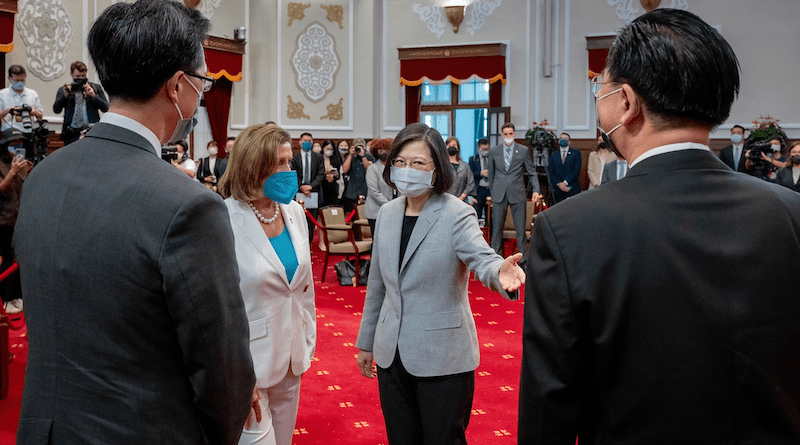Beijing Looking Forward To November US Election For Definitive Answer To Pelosi’s Visit To Taiwan – OpEd
US House Speaker Nancy Pelosi’s visit to Taiwan was a huge success which was achieved under bipartisan support and served as a show of strength against China. However, under the veneer of this favorable situation, lies a different reality. The trip did not have the support of the Republican and Democratic parties; since Pelosi threatened the national security of the United States with her act and created a deep gap between the two superpowers of the world.
The trip had inverse consequences to such a high extent that the repercussions overshadowed the intended goals and heightened the level of the tensions between Beijing and Washington as China suspended many of its cooperation agreements with the United States after the trip.
China’s reaction was totally predictable and it was because of this reaction that many of both governmental and non-governmental American analysts tried to cancel or at least postpone it. The US administration’s later position to support “One China” policy and its efforts to emphasize the normality of the trip originated from the fear of this reaction too.
In addition, a large number of American analysts considered the trip by the Speaker of the House of Representatives, despite the opposition of the intelligence agencies and military officials, to be a personal action by her, which had little to do with the political and security needs of the United States. Simply speaking, having in mind the fact that Nancy Pelosi is 82 years old and also it is highly probable that Republicans will win the midterm elections, she is on the verge of the end of her political life and has seen this trip as a fertile ground to put a heroic end to her political life. However, this adventurous act could have led to dangerous tensions and even war. In other words, the symbolic trip, which had no other achievement other than its symbolic nature, not only failed to ensure the security of Taiwan and the United States but also led to a rise of threats and tensions by both parties.
Another worrying point is that Pelosi’s action can lead to strong reactions from Beijing in the future of China’s relations with the United States. A complete sea and air blockade of Taiwan can cut the island’s connection with the outside world and disrupt the export process of semiconductors as one of the most important products needed by the world. In case this scenario is realized, the first country that will be severely affected will be the United States, almost all of its computer component manufacturing companies are directly or indirectly dependent on Taiwan’s products.
Therefore, many of these companies, such as IBM, have decided to build more semiconductor factories in the United States itself in order to avoid the inevitable consequences in the event of a blockade of Taiwan or a full-scale war by China against this island. However, it should be kept in mind that any action before the end of Silicon Valley’s dependence on Taiwan’s products will increase the possibility of China’s action against Taiwan and, in turn, the provocative behavior of American statesmen against Beijing.
One of the important issues related to this trip was bipartisan support of Pelosi’s action; as many high-ranking members of the Republican Party supported the trip and considered it useful and necessary for the position of the United States in the world. Among Pelosi’s Republican supporters is the former Speaker of the House of Representatives, Newt Gingrich, who was the last head of the House of Representatives to visit Taiwan. Gingrich argues that if China tolerated his action twenty-five years ago, then there is no reason that does not tolerate Pelosi’s visit to Taiwan.
However, it must be maintained that this argument is fundamentally rejected, since, at that time, China not only did not have its current military power but also economically, it was not capable of directly engaging with America. In addition, in 1997, when that trip was made, the government and the House of Representatives were of different parties and this lack of coherence could be an excuse for the US administration to reduce China’s concern about the visit.
But now, not only the American government and Congress are in full alignment with each other, but a figure has been nominated as the president of the United States that, maybe because of his old age, has abandoned the policies that the United States has had for Taiwan for years; verbally questioning and implicitly violating the one-China policy, and spoken explicitly of the US commitment to defend Taiwan in the event of a Chinese invasion. Although his expressions were immediately corrected by the spokesmen of the White House and the Ministry of Foreign Affairs and they emphasized the United States’ unchanged commitment to the “One China” policy, Beijing does not so simply overlook Biden’s rhetoric.
In fact, China considers these words and denials, not mere verbal mistakes, but a tactic to test its tolerance threshold, trying to express contradictory opinions to confuse Beijing and also avoiding accepting the responsibility of taking a position.
To conclude, it should be said that provocative actions such as the visit of high-ranking American officials to Taiwan, even if it has bipartisan support, are not only not considered a show of US power, but also results in threat escalation (by increasing the probability of Attack on Taiwan or its blockade); in addition, these kinds of acts endanger the production and exportation of semiconductors and put the function of USA corporations in danger.
Therefore, any hostile action by the United States against China over Taiwan will have irreparable consequences for the United States, and if the representatives of the two parties, especially the Republican Party, continue their wrong policies towards Beijing after the November elections, it will affect not only the relations between the USA and Europe but also the entire global relations.

